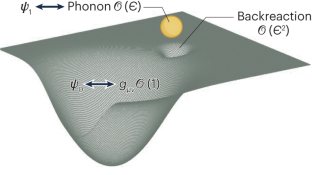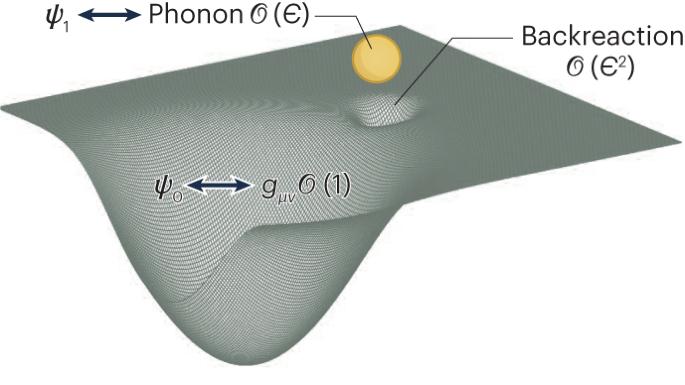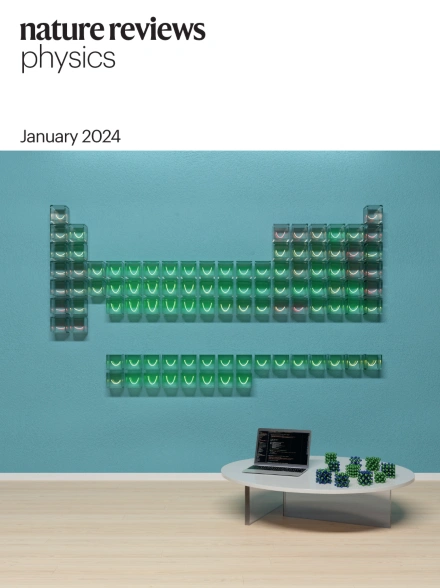Analogue simulations of quantum gravity with fluids
IF 44.8
1区 物理与天体物理
Q1 PHYSICS, APPLIED
引用次数: 2
Abstract
Technological advances in controlling and manipulating fluids have enabled the experimental realization of acoustic analogues of gravitational black holes. A flowing fluid provides an effective curved spacetime on which sound waves can propagate, allowing the simulation of gravitational geometries and related phenomena. The past decade has witnessed various hydrodynamic experiments testing disparate aspects of black-hole physics culminating with experimental evidence of Hawking radiation and Penrose superradiance. In this Perspective article, we discuss the potential use of analogue hydrodynamic systems beyond classical general relativity towards the exploration of quantum gravitational effects. These include possible insights into the information-loss paradox, black-hole physics with Planck-scale quantum corrections, emergent gravity scenarios and the regularization of curvature singularities. We aim at bridging the gap between the non-overlapping communities of experimentalists working with classical and quantum fluids and quantum-gravity theorists, by illustrating the opportunities made possible by the latest experimental and theoretical developments in these areas. Experiments in fluids have enabled the simulation of several aspects of black holes and quantum field theory in curved spacetime. This Perspective article discusses possible hydrodynamic simulators of quantum gravitational effects, ranging from the resolution of curvature singularities to the emergence of spacetime geometry from quantum degrees of freedom.


流体对量子引力的模拟模拟
控制和操纵流体方面的技术进步使得引力黑洞的声学模拟得以在实验中实现。流动的流体提供了一个有效的弯曲时空,声波可以在其上传播,从而可以模拟引力几何和相关现象。过去十年间,各种流体力学实验对黑洞物理学的不同方面进行了测试,最终获得了霍金辐射和彭罗斯超光度的实验证据。在这篇 "视角 "文章中,我们将讨论在经典广义相对论之外使用模拟流体力学系统探索量子引力效应的可能性。其中包括对信息丢失悖论、具有普朗克尺度量子修正的黑洞物理学、突发引力情景和曲率奇点正则化的可能见解。我们的目标是,通过说明这些领域最新的实验和理论发展所带来的机遇,在从事经典和量子流体研究的实验学家与量子引力理论学家这两个互不重叠的群体之间架起一座桥梁。流体实验使我们能够在弯曲时空中模拟黑洞和量子场论的多个方面。这篇 "视角 "文章讨论了量子引力效应的可能流体力学模拟器,从曲率奇点的解决到量子自由度的时空几何出现。
本文章由计算机程序翻译,如有差异,请以英文原文为准。
求助全文
约1分钟内获得全文
求助全文
来源期刊

Nature Reviews Physics
Multiple-
CiteScore
47.80
自引率
0.50%
发文量
122
期刊介绍:
Nature Reviews Physics is an online-only reviews journal, part of the Nature Reviews portfolio of journals. It publishes high-quality technical reference, review, and commentary articles in all areas of fundamental and applied physics. The journal offers a range of content types, including Reviews, Perspectives, Roadmaps, Technical Reviews, Expert Recommendations, Comments, Editorials, Research Highlights, Features, and News & Views, which cover significant advances in the field and topical issues. Nature Reviews Physics is published monthly from January 2019 and does not have external, academic editors. Instead, all editorial decisions are made by a dedicated team of full-time professional editors.
 求助内容:
求助内容: 应助结果提醒方式:
应助结果提醒方式:


